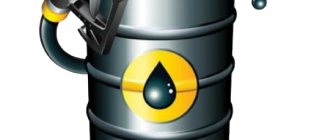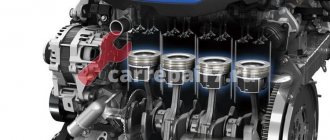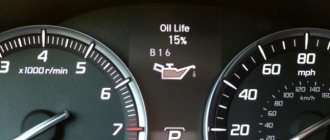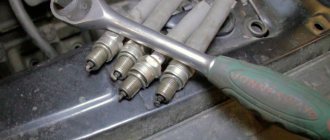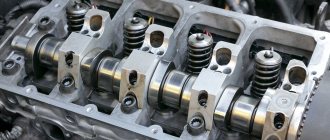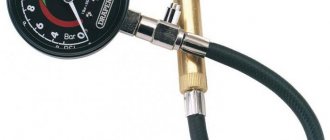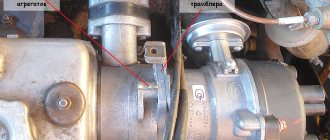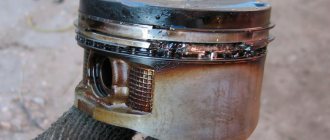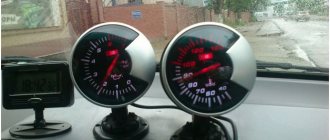Today we will talk about the causes of knocking in a car engine, how dangerous this phenomenon is, what to do in a given situation depending on its complexity, and how to diagnose a malfunction.
Quiet, measured noise of operation without extraneous sounds of the car’s power plant pleases every car owner, because this indicates the complete serviceability of the engine.
But the appearance of extraneous sounds during operation, in particular knocking, makes the driver worry.
There are more than enough reasons for knocking in engines, some of them only indicate the need for maintenance, but there are knocks that are a signal of major problems with the engine.
Causes of engine knocking
The knock itself is formed when one element of the power plant hits another.
At the same time, the noise in the engine varies, it occurs under certain conditions and disappears when they change.
In most cases, knocking is a signal of problems with certain mechanisms - the timing belt, crank mechanism, cylinder-piston group, but they also appear in other components of the unit.
Criteria for the nature of the knock.
Extraneous noise generated in the power plant can be divided into several criteria:
- The power of sound;
- Cause-and-effect relationships;
- Sound (metallic knocking, etc.);
- Cyclicality.
Let's look at each of the criteria.
The knocking sound in the engine may be weak and barely audible - in this case, the car can continue to be used, but it will not hurt to carry out diagnostic work.
There is an average knock that can be heard clearly, but it is not difficult to drown it out, for example, with loud music.
A car with such knocking noises can be used for a short period of time, enough to be able to get to a garage or service center.
Distinct loud sounds coming from inside the power unit indicate significant problems in its operation.
With such sounds, the engine is turned off and the car is delivered to the garage or service only by a tow truck or in tow, since serious problems may arise with the engine.
Cause-and-effect relationships in the occurrence of knocking occur after non-professionals intervene in the power unit.
That is, whether, on the contrary, failure to perform technical work or repairs will lead to engine malfunctions.
Sources of knocking (metallic) in the engine:
- Oil that is not recommended for use on this engine or counterfeit products;
- Poor quality or defective parts that were installed during repairs can also cause knocking in the engine.
- Severe wear of the components will naturally lead to the appearance of extraneous noise.
Types of sound and how they differ
Based on the sound, engine knocking is divided into loud and dull.
A loud knock, also called metallic, occurs when parts made of hard metals collide with each other, and there is no oil layer between the parts.
A dull knock in the engine occurs when parts strike, one of which is made of soft metal, and there is an oil layer between the parts.
Cyclicality
By the cyclical nature of the knocks, you can roughly determine which mechanism requires intervention.
Thus, a knock in the engine occurs in proportion to the rotation of the crankshaft, indicating possible problems with the cylinder-piston group, gas distribution or crank mechanisms.
The source of spontaneous knocking that occurs haphazardly may be located in the engine attachment.
For example, a knocking sound can be made by a loose generator, and the noise will arise due to the vibration of the power unit.
Potential Causes
The appearance of a metallic knock in the engine is not at all a pleasant sound or a positive symptom. This situation should alert the car owner and make him think about carrying out diagnostic measures.
Having roughly understood how you can determine what exactly is knocking in the engine, you need to listen to your internal combustion engine, walk with a stethoscope through different areas and test the operation of the engine in different modes. This will allow you to understand when knocking occurs and at what moments they increase or decrease. If you cannot conduct wiretapping yourself, contact specialists who will carry out diagnostics using special equipment that determines the sources and nature of knocking noises.
As for the potential causes of unpleasant tapping noises, most often the culprits should be sought among:
- cylinder pistons;
- piston pins;
- camshaft;
- crankshaft;
- main bearings;
- connecting rod bearings;
- valves;
- cylinder head, etc.
It is worth noting that when two elements of the gas distribution mechanism, which are made of durable metals, wear out, the knocking noise can remain unchanged for a long time. If a soft element comes into contact with a harder one, then the sounds will quickly intensify.
You should consider the situations in which engines may knock, and also identify the most dangerous sources of unusual noise.
Cold engine
Many car owners have experienced a knocking sound when starting the engine. Moreover, sometimes only engine knocking was observed upon direct start-up, and after a short warm-up it disappeared.
Some will immediately say that in such a situation, worn valves may be knocking on a cold engine. But don't rush to conclusions. It is believed that knocking noises during startup, which then disappear, are not something dangerous. That is, the car can be used. Experienced drivers only recommend warming up the engine before driving.
But here a logical question arises as to why there is a knocking noise when it’s cold, but after warming up it disappears. This is due to natural wear and tear of internal combustion engine parts. But with expansion caused by heating, the gaps return to their normal state.
Trick knockers
In addition, there is such a thing as “deceiver” knocks.
The essence of this concept is that a knock that seems to accurately indicate a certain malfunction has a completely different nature.
For example, when a diesel engine creates a load, a loud knocking sound appears, signaling problems with the crank mechanism. But the same knocking noise occurs with this engine when there is a malfunction in the power system.
Or, over time, a loose crankshaft pulley will begin to make sounds very similar to the knocking of the crankshaft itself, so it is important to first determine what exactly was the source of the extraneous sounds.
In any case, the occurrence of extraneous noise should not be ignored and professional diagnostics cannot be avoided.
Extraneous knocking noises when the engine is idling
Let's look at the causes of knocking in the engine under different operating modes.
First, let's look at the reasons for its occurrence at idle.
Here you first need to determine the behavior of the knock in the future.
Thus, a slight knocking sound in the engine at idle, emanating from the middle part of the engine, having a uniform intensity, while the sound intensity decreases somewhat with increasing speed, presumably indicates that small third-party parts or debris from parts have entered the cylinder.
This problem is eliminated by removing the block head and removing foreign objects.
The same knock, but increasing with increasing speed, signals wear of the cylinder-piston group, damage to the piston skirts due to overheating.
This malfunction can only be eliminated by replacing the cylinder-piston group.
The appearance of a similar noise, but with half the intensity, and heard in the upper part of the unit indicates a violation in the operation of the timing belt.
If a knock is present not only in idle, but also in other modes, this indicates wear on the camshaft and a violation of valve adjustment.
If the thermal gap is adjusted using hydraulic compensators, then the knocking noise as the speed increases, as a rule, decreases. This indicates a malfunction of the latter.
Problems with the cylinder head are solved by removing the valve covers, determining the source of the sound, replacing worn elements or adjusting the clearance.
A uniform knocking sound, significantly increasing with increasing speed, if it comes from below, this indicates the destruction of the balancer shaft bearings, the beginning of the destruction of the connecting rod liner, and deformation of the connecting rod itself.
These are some of the most dangerous causes of noise.
If at idle you hear an uneven sound that completely disappears as the speed increases, this is a signal of problems with the bearings of the engine attachments, for example, a malfunction of the pump bearing.
A muffled, uneven knock that appears at idle and disappears as the speed increases indicates that the permissible oil level has been exceeded due to working fluids or fuel getting into it. In this case, an internal breakdown of the cylinder head gasket occurred and antifreeze began to flow into the oil.
All of the above malfunctions, except for destruction of the connecting rod bearings and balance shafts, are generally not very dangerous; the driver has the opportunity to deliver the car under its own power to a service center or garage.
Read more: Why is the hydraulic compensator knocking?
Knocking in the engine: possible causes and repairs
The heart of any car, naturally, can be called the engine. Its design is quite complex, and repair work usually costs a lot of money. It is for this reason that if any extraneous sounds appear, diagnostics should be carried out immediately to find out the source of the problem. Many drivers are faced with the phenomenon of engine knocking. We will tell you why it occurs, how to diagnose it, and whether it is possible to repair it.
Knocking in the engine is an unpleasant phenomenon, and many people associate it with large waste. If you take timely measures, you can get by with a minimum of money spent, since there are dozens of parts in the design of the motor, then almost every one of them can make noise. The main causes of knocking are:
- insufficient oil level in the crankcase;
- Constantly high loads on the internal combustion engine, which leads to accelerated wear and the appearance of gaps;
- regular overheating;
- using low quality oil.
All this can cause a breakdown of a particular unit, which will make a characteristic knocking noise and, accordingly, lead to a number of other consequences.
Diagnosing the problem
The first thing any driver can do is determine when exactly the knocking noise occurs.
Here you may encounter several knocking situations:
- immediately when cold (immediately after turning on the engine);
- after warming up to hot;
- only at idle speed;
- knocking noise under load.
We will consider each situation separately below. A popular question among motorists is how to determine what is knocking in the engine. Here you can use a stethoscope or a homemade equivalent. It will help localize the problem with relatively high accuracy. It will be enough for you to put your ear to the unit to immediately understand that it is the culprit.
Engine knocking when cold
If you hear a dull knock when starting the engine, the cause is the crankshaft. It is in the first minutes that the sound is heard as clearly as possible, since the oil has not yet warmed up and, accordingly, has not lubricated this part. Over time, the sound disappears, but it can still be heard at idle. The knock, as was said, is dull, but its sonority can increase with increasing speed.
The main reason is severe wear of the shaft bearings, which leads to a large gap. The situation is further worsened by the use of low-quality oil with various impurities. The only way you can diagnose whether the crankshaft is the cause is at a specialized car service center by disassembling the engine. Repairs can be done by boring the crankshaft, but in particularly advanced cases, drivers will have to fork out money for a new part.
Also, another reason for knocking when cold is a malfunction of the camshaft. If the camshaft is heavily worn, of course, you will clearly hear sounds even after the car has warmed up. Also, the knocking frequency of this element is half the speed of the motor itself. This fact will additionally help with diagnosis. The reasons are similar to those described above: oil starvation, use of counterfeit products and increased wear of bearings.
Knocking from the camshaft is especially dangerous in cars equipped with hydraulic compensators. The problem is that they will compensate for the gap created between the pushrod and the camshaft, causing the valves to be misaligned. The result will be a drop in compression, a decrease in power and increased fuel consumption. To check the camshaft, you will have to disassemble the engine. If you do not have such skills, contact a car service.
Often the source of noise is the timing chain. In systems with hydraulic tension, oil may not flow immediately, which leads to knocking. The hydraulic compensators themselves can also “click.” In this case, they must be replaced immediately.
Knocking in the engine when hot
While the engine is cold and the oil is not warmed up, the gaps in the parts do not manifest themselves in any way. The knocking noise becomes more pronounced as the oil thins. There may be several reasons:
- increased gap between the crankshaft journal and the main bearings;
- in connecting rod bearings when a sufficiently large gap is formed between the crankshaft journal and the support;
- when cracks appear in the piston skirt or the piston pin itself.
It is possible to diagnose which of the above options leads to knocking only by disassembling the engine. Here you will need the help of a real specialist. Disassembling an engine is one thing, but repairing the breakdown and putting it back together is a completely different task. If you don’t have special skills, you shouldn’t risk doing repairs yourself.
Extraneous sounds when idling
Knocking at idle is not that dangerous, so don't panic right away. However, it is recommended to promptly diagnose the problem to eliminate the problem. As the speed increases, the noise may disappear or remain barely audible. It's worth checking here:
- pump and generator pulley;
- engine protection and timing case;
- camshaft gears for backlash (if they are provided for by the design);
- crankshaft pulley.
There are cases (especially in cars with an automatic transmission) when a crack appears in the flywheel. It will not be possible to eliminate it. Here you will have to replace the entire flywheel.
Under load on the motor
Another fairly common situation is the appearance of knocking only under load. The main reason for engine knocking in such a situation is the appearance of detonation. Gasoline or diesel may ignite before the required moment, which leads to incorrect operation of the entire internal combustion engine. During detonation, you will hear a frequent and loud knock, which will clearly manifest itself in the following situations:
- during acceleration of the vehicle;
- when the driver uses a gear that is too high and does not correspond to the load on the engine;
- when driving with a large load or trailer.
Sufficiently experienced drivers can always detect the sound of detonation. Also, a number of cars are equipped with a special sensor that informs about this phenomenon. You will usually see an illuminated Check Engine light on your dashboard. One of the main causes of detonation is the use of low-quality fuel with a low octane number. During detonation, deposits will form on the cylinder walls, which, even after using high-quality gasoline, will cause a number of problems. At the same time, the work of inexperienced auto mechanics can lead to an increased compression ratio, as well as incorrect functioning of some engine components.
Loud knock in any conditions
If you hear distinct sounds at the top of the engine under any load, even at idle, then the problem is the valves. The tone of the sound may vary depending on engine operation. The reason for this is natural wear and tear of the valves. In some cases, it is enough just to make a quality adjustment. If the wear is too great, replacement is necessary.
On certain engines, knocking is caused by contact of the valves with the piston. This occurs because the timing belt is off by one or more notches. We recommend checking its tension and correct positioning. This is done using special marks. Be careful as this problem can eventually lead to complete destruction of the valves or damage to the cylinder.
A number of other reasons
Other components that have not yet been described can also cause knocking. This list includes:
- Fuel pump drive. You will hear a loud knocking sound similar to the sound from the valves.
- Connecting rods knocking due to worn bearings. By turning off the cylinders one by one, you can diagnose the problem.
- Incorrect cylinder block gasket dimensions. It protrudes into the combustion chamber, where it is touched by the cylinder. Characterized by a dull sound.
- Plunger pairs. They can make noise in diesel units. Not critical.
The complexity of the motor design makes diagnosis and repair a complex process. The best option is a trip to a specialized technical center. As a rule, such workshops have all the necessary equipment that will help identify the cause of the knocking. If the car has an electronic control unit, you can additionally perform computer diagnostics.
Prevention measures
In order not to spend huge amounts of money on diagnostics and repairs, it is better to prevent any problem. Everyone is familiar with the recommendations:
- Regularly undergo technical inspection. This will allow problems to be identified at an early stage.
- Change the oil every 10-15 thousand kilometers. Use only products recommended by the vehicle manufacturer. You can find the information you need in the vehicle's owner's manual.
- Use high quality gasoline. If you need to fill your car with 95 or more, you shouldn’t risk using 92 for the sake of saving.
Remember that spending on motor oil or fuel is simply not commensurate with major engine repairs. The knock indicates an obvious problem, and if it is not dealt with, the consequences will not follow.
Engine knocking when cold
An uneven sharp metallic knocking sound when cold, intensifying as it warms up, indicates:
- Turning of the connecting rod bearing around the axis or its destruction;
- Significant wear of the main liners, deformation of the crankshaft journals. In this case, the sound comes from the bottom of the motor;
- It is possible that sound may occur in the middle part of the engine due to significant wear of the mounting holes of the piston pins; it usually appears with a sharp increase in engine speed.
Many of the noise sources described are also typical for the engine operating conditions described below.
Possible causes of engine knocking
It is worth noting that knocking may not progress at the same rate, that is, it may quickly or slowly intensify during operation. The list of main elements of the CPG, timing gear and crankshaft that can knock includes:
- knocking of the piston in the cylinder;
- piston pins knock;
- the camshaft knocks in the cylinder head;
- knocking of the crankshaft in the cylinder block;
- rocker arm and valve mechanism axis;
- valve and valve guide;
- valve and cylinder head;
If two timing parts, which are made of hard material, wear out, the engine may knock equally for a long period of time. If soft elements that work in tandem with parts made of harder material (main, connecting rod bearings, camshaft bearings) have worn out, then the extraneous sound will quickly intensify. Next we will look at the most dangerous engine knocks.
The pistons are knocking
The sound of a knocking piston in the cylinders is localized in the cylinder block, has a dull tone (reminiscent of the sound of knocking on pottery), and may also be accompanied by clicks. It most often appears when it is cold, as well as at low speeds and when the gas is suddenly released while driving. After warming up, the knocking sound of the pistons on a cold engine disappears, as the piston undergoes thermal expansion. Usually the piston knocks when a gap of about 0.3 - 0.4 mm appears.
Piston pin knock
The piston pins knock loudly and high in tone, the knock is clearly metallic. It is clearly audible when changing the gas, as well as at the moment of releasing the gas or pressing the accelerator to accelerate. The localization zone is the cylinder block. Usually appear when there is a gap of about 0.1 mm.
Additionally, the malfunction is diagnosed by unscrewing the spark plug. With the spark plugs removed, fuel combustion in the cylinder does not occur, which means there is no load on the piston.
Let us add that such a knock also occurs as a result of using fuel that is unsuitable for this type of engine (detonation), as well as with a significant load on the engine at low crankshaft speeds (driving uphill in high gear).
We also recommend reading the article about why the engine may have a metallic knock when cold. From this article you will learn about the peculiarities of the knocking of the power unit before reaching operating temperatures.
Knock of crankshaft main bearings (liners)
This knocking noise occurs as a result of wear that appears on the crankshaft liners. The sound is metallic, slightly muffled, and localized in the area of the engine crankcase. It can be clearly heard at low speeds of a warmed-up engine (low engine oil pressure), when the speed rises sharply and when the gas is released. The gaps increase between the neck and the liner, amounting to about 0.1-0.2 mm. When the lubricant pressure drops to critically low levels, the knocking will be loud in all modes.
It should be noted that the crankshaft can also suddenly start knocking due to the use of low-quality motor oil or a lubricant that does not meet the manufacturer’s tolerances for this type of internal combustion engine. In this case, the oil must be changed immediately, and the lubrication system must be flushed before replacement.
Connecting rod bearings are knocking
If the connecting rod bearings are knocking, then the sound is similar to a similar malfunction of the main bearings, but can be heard more clearly. The appearance of such a knocking noise with a sharply increasing intensity when the crankshaft speed changes indicates the need for urgent repairs. It is prohibited to operate the engine with such a knocking noise, since the engine, in simple terms, risks “caught a wedge”.
Knock at low speeds
A knocking sound in the engine at low speeds when the engine is not warmed up, if it comes from the top, indicates problems with the hydraulic compensators.
A uniform knocking sound in the upper part, which intensifies significantly when warming up, signals the beginning of destruction of the valve seat.
It is worth considering the possibility of damage to the bearings of attachments.
It is also possible that the valve timing is disrupted due to the timing belt slipping, as a result of which the piston bottoms come into contact with the valves, hence the knocking sound in the engine.
Filling with low octane gasoline can lead to detonation in the engine, which is why knocking occurs.
If you detect extraneous noise while the engine is running cold at low speeds, it is better to immediately try to determine where exactly the noise is coming from.
If the knocking sound in the engine comes from the top, the car can still be driven for a short time.
If sharp noises appear from the lower part of the engine, it is better to immediately stop the power plant and deliver the car to the repair site by tow truck or in tow.
Third-party sounds on startup
Engine knocking during startup most often occurs due to malfunctions in the lubrication system.
Poor performance of the oil pump, insufficient amount of oil and clogging of the channels with pollutants leads to the fact that the oil does not have time to reach all the rubbing surfaces in time, which is why grinding and knocking noises are heard.
Due to problems with the lubrication system, oil does not flow into the hydraulic compensators, without which they begin to knock.
If noises appear during startup, it is advisable to stop the engine and check the oil level. If necessary, bring the level to the desired value.
If this does not help, you can change the oil and pre-flush the system.
Next, if the knocking noise persists during startup, you need to check the condition of the oil pump.
Causes of sounds when hot
Knocking in the engine when “hot” can occur for all of the above reasons.
In any case, it is important to determine the nature of the extraneous noise, the approximate place where it is coming from, and then take action.
Almost always, in road conditions, it will not be possible to eliminate the malfunction; the car will need to be delivered to the repair site to accurately determine the cause.
But preliminary diagnostics will tell you which way the car will have to be delivered.
If there is a knocking sound at the top, you can drive the car under your own power, but check the oil level before doing so.
A sharp sound from the bottom of the engine will indicate a problem with the crank mechanism, which is why the car must be delivered by a tow truck.
Engine diagnostics and identifying the causes of knocking
Only an experienced engine mechanic, who has already gone through many engines in parts, can evaluate the nature of the knocking, frequency and identify the true cause of its occurrence. Therefore, it is important to choose a car service that specializes not only in computer diagnostics, but also provides mechanical engine repair services.
Diagnosing a knock is comparable to solving a rebus - you can never be 100 percent sure of the correct diagnosis. Even an experienced expert, diagnosing the nature of the knock, identifying the area of its localization and tonality, will call the cause “probable”. And when diagnosing a hot engine, special skill is required - not everyone can correctly hear a knock against the background of the general increasing noise of a running engine.
Finding out the cause on your own is an almost impossible task; it is important for the driver to give the most accurate description of the knocking: under what circumstances the knocking first appeared, how its nature and frequency changes when the engine starts, on a cold start and on a hot one, what happens when the speed decreases and increases, under load , at idle speed. This important information will help you successfully diagnose and decide on repair work.
The most important thing is not to forget that a knocking sound in the engine when it’s hot is a serious problem that needs to be solved immediately. The fate of the engine and the operation of the vehicle as a whole depends on this. Sometimes the engine undergoes partial disassembly, but it also happens that complete disassembly is indispensable.
Source
Features of knocking in the engines of VAZ cars
The described causes of third-party noise are typical for all engines, including VAZ models.
In addition to the above sources of the problem in classic models, knocking in VAZ engines can be caused by a strong stretch of the timing chain or a weakening of the chain tensioner.
And for models starting from the VAZ 2108, additional increased noise may occur due to wear of the belt tensioner bearing.
Diesel engines, additional possible sources of knocking.
If a diesel engine knocks, in addition to problems with the crank mechanism, cylinder-piston group and timing, the knock can be caused by problems with the power system, in particular, malfunctions with the injection pump, turbine or injectors.
Or a violation of the timing of fuel injection.
Read on the topic: Do-it-yourself turbine repair.
What is a knock in the internal combustion engine?
To begin with, we should examine such a simple concept at first glance as a knock in the engine. This is the appearance of extraneous noise with a characteristic sound caused by the contact of various surfaces, parts and components of the motor.
Often, if the engine knocks, this indicates symptoms of critical wear and gap formation. Characteristic unpleasant noises usually appear when the permissible gap sizes increase by 2 times or more. The force of impact and contact directly depends on the size of the gap.
That is, here we are talking about the collision of engine elements with each other. At the same time, during impacts, the load on the area where the components of the internal combustion engine are in contact increases sharply. This significantly accelerates wear and tear, and leads to the need to deal with repair issues in the very near future.
The increase in gap can be influenced by:
- initial gap size;
- engine parts;
- materials used;
- acting loads;
- efficiency of the lubrication system;
- performance of the cooling system;
- driving style, etc.
Because of this, some parts can knock, but at the same time withstand several tens of thousands of kilometers without causing any serious or dangerous consequences. This applies more to timing knocks. And others can cause a breakdown after 5-20 kilometers. Here, the most vulnerable elements are the cylinder-piston group and the crank mechanism.
There are even situations when the engine begins to knock, although the clearances remain normal and there is no severe wear. Similar symptoms may indicate:
- detonation and heavy loads on the engine;
- misalignment of engine elements;
- jamming of mechanisms;
- oil wear.
If you encounter knocking noises, they should never be ignored. Even when it seems that the car is behaving normally, the engine pulls and does not lose power.
Sound diagnostics
If a problem arises that the engine is knocking, as already said, it is first of all important to determine the nature of the knock, as well as the location of its occurrence.
Some of the reasons can be diagnosed without disassembling the power plant.
Thus, a special device - a technical phonendoscope - will allow you to more accurately determine the location of the noise.
Using it, the engine is listened to and it is determined in which mechanism or system malfunctions have occurred.
You can also use more advanced equipment, for example, a motor tester.
Read more: Car diagnostic devices.
A simple procedure will allow you to determine the destruction of the connecting rod liner.
It is done like this: with the engine running, when a loud knocking noise appears, the high voltage wire is removed from the spark plug one by one on each cylinder.
If the fault lies in the connecting rod bearing, then disconnecting the wire on the cylinder that has the problem will significantly reduce the knocking noise.
If noise occurs, when there is a suspicion of destruction of the bearing of any attachment, you can determine which equipment has problems by disconnecting their drive from the on-board network.
If after this the extraneous noise disappears, the faulty equipment is replaced or sent for repair.
Knocks at the top of the engine.
They are diagnosed sequentially. First, the condition of the cylinder head elements and their fastening is checked.
Then the valves are adjusted or the hydraulic compensators are washed. At the same time, the level and condition of the oil are checked.
Then the head is removed from the engine and a full range of restoration work is carried out.
Middle and lower part of the engine.
An accurate determination of the sources of knocking in the lower part of the engine is possible only after disassembling the engine.
Since severe wear of the cylinder-piston group also causes unwanted sound, therefore, if a knock occurs in the middle part, the condition of this group can be assessed by measuring compression.
Knock or detonation?
Most even experienced motorists mistakenly mistake detonation for knocking, which has received the common name - knocking fingers.
It is worth noting that the phenomenon of detonation has nothing to do with knocking occurring in the engine.
Detonation is a consequence of:
- use of low-quality fuel;
- engine overheating;
- constant formation of carbon deposits on valve heads, inside combustion chambers or bottom parts of pistons;
- early ignition.
The danger of this phenomenon is that it destroys parts of the power unit.
Note that the described sounds (with the exception of detonation and valve knocking) are permanent companions of old cars with high mileage.
Their appearance is a signal to immediately contact a car service for engine repair.
In addition to these knocks, you can also hear sounds that occur when the bearings of the generator or water pump fail.
You can check this by removing the belt from the generator or pump drive and starting the engine. A breakdown in one of these units is indicated by the absence of knocking noises.
If the knock is caused by detonation, its presence can be determined by the behavior of the power plant. If it continues to work for some time after a forced stop, there is detonation in the cylinders.
Diesel power plants.
Diagnostics in these engines is carried out identically to those described, but their fuel system can be diagnosed only after removing its elements and only on special stands.
Also read how to diagnose a car using a laptop.
Diesel engine noise in cold and hot weather
As a rule, on a diesel power plant, sounds and noises are associated with plunger pairs (not critical), faulty injection pump (high pressure fuel pump), crankshaft, etc. Let's consider all the main reasons below.
If the crankshaft knocks on a diesel engine
Knocks in a diesel engine appear no less frequently than in a gasoline engine.
Most often the crankshaft knocks on such internal combustion engines. This is called connecting rod knocking and is a very serious sign of internal combustion engine failure, including turbodiesel engines. If on a gasoline unit the same knock is of a different nature, then on a diesel unit it indicates extended play in the connecting rod journal. As a result, the piston hits the cylinder head and noise appears.
Another reason, no less problematic. It may indicate a loose connecting rod nut. This sound, compared to the first one, is duller and more reminiscent of a quiet clanging of metal (a similar sound is produced by an incorrectly aligned timing belt).
When diagnosing crankshaft sounds of a diesel engine, it is not customary to do so, as in similar cases with a gasoline engine. In other words, turning off the power to each cylinder will not work here, since the crankshaft will continue to work, and the piston will hit the cylinder head (cylinder head).
Attention. It is strictly forbidden to drive a car with a diesel engine if the connecting rod is knocking. The car must be urgently delivered to the service station by tow truck (or, in extreme cases, towed). Here they will bore the crankshaft, replace the bearings, make the necessary adjustments, grinding, etc.
It is interesting that crankshaft knocks are heard most clearly when the lubricant has not yet had time to fully reach the bearing group. After thorough heating, the problem is signaled less intensely and the previous noise disappears. But on an unheated internal combustion engine, the sound is measured, reminiscent of a clang and alternating dull noise. The rhythm of sounds will increase with increasing speed.
As mentioned above, the shaft can also rattle due to the appearance of excessively increased play that has arisen in the connecting rod-main bearings.
It is better to entrust the work of eliminating backlash to a professional. It takes a lot of time and effort
Operating a car engine with dirty lubricant or low-quality oil, as well as untimely replacement of it in a diesel engine, can also lead to increased clearances and wear. And the crankshaft can also knock due to fuel getting into the lubricant when the cylinder head is damaged.
An equally well-known cause of diesel noise is the clogging of the oil strainer. Because of this, small pieces of debris and shavings then penetrate into the crankshaft bearings.
Also, knocking in a diesel engine occurs as a result of a drop in oil pressure or lack of lubricant - an essential component of bearings. The problem is often caused by unstable functioning of the oil pump.
We recommend: Decoding error codes for Lada Priora
If the camshaft is noisy
The noise from the camshaft is quieter than the crankshaft
The camshaft of a diesel power plant is distinguished by a less sonorous hum, more noticeable in the first stage at the time of starting the unit from cold. In terms of rhythm, the camshaft sound is almost half as loud in frequency when compared with the same crankshaft frequency. As soon as the lubricant reaches the camshaft bearings, the noise disappears (usually this takes no more than 3 seconds after starting).
A factor causing such knocking of the unit is faulty bearings. Over time, they wear out, which leads to knocking. The rest of the noise factors are similar to the crankshaft ones, with only one difference - the noise of the unit increases as it wears out and on a hot engine.
It is allowed to use a car with such a problem under the hood, but only for a short time and under one condition - if there are no hydraulic compensators in the timing belt. Otherwise, their presence will lead to more serious consequences, further defects that are much more difficult to repair.
Detonation sounds: causes and consequences
On diesel engines, early injection of fuel can cause detonation combustion of the combustible mixture. This leads to rough and incorrect operation of the power plant.
You can understand the essence of detonation in more detail like this. During detonation, the fuel does not burn as it should, but explodes. The entire portion of fuel burns instantly, and the pressure on the piston increases sharply. As a result of all this, a shock wave is formed, destroying not only the piston itself, but also the entire group: liners, rings.
Engine detonation is considered a rather dangerous sign.
The main distinguishing feature of detonation in a diesel installation is the characteristic iron clang. By the way, detonation in this internal combustion engine can easily occur due to faulty injectors.
Other reasons that can become a source of noise in a diesel engine:
- If the installation is noisy after a service station where the cylinder head gasket was changed, the sound will resemble the knocking of valves. This is not the case for everything to go away by itself. You will have to go to the service center again and order a repeat replacement procedure (the knocking sound is due to the fact that the piston hits the protruding part of the gasket).
- Knocks that often occur at idle. This is most likely knocking in the fuel injection pump area. By the way, the same sounds characterize the noise of plunger pairs. Note. The fuel injection pump is checked at a special type of stand.
- Knocks may appear due to incorrect operation of the hydraulic compensators. When the latter fail, a characteristic knocking sound is observed. In case of strong noise when cold, with a gradual decrease in knocking as the engine warms up, the expansion joints are replaced, and the engine is cleaned using a special technology.
- Insufficient chain or timing belt tension. The knocking noise increases as soon as the engine speed increases. The noise is created due to the fact that the belt drive hits the protective casing.
- As a result of a violation of the gas distribution phases. This often happens after installing a gasket that is not the original size.


